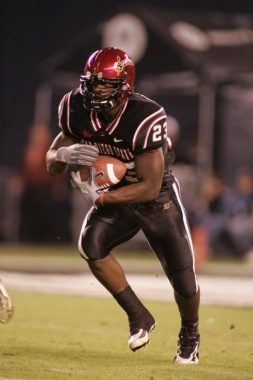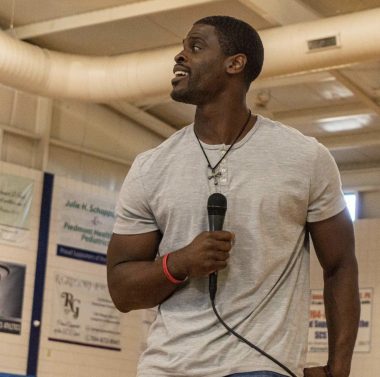Tyler Campbell Traded Football Cleats for a Microphone
Written by |

Tyler Campbell speaking at Flavors of Austin, an annual multiple sclerosis charity event. (Photo courtesy of Tyler Campbell)
It took some time for Tyler Campbell to truly accept he had relapsing-remitting multiple sclerosis.
The San Diego State University running back had just finished his junior year in 2007 when his multiple sclerosis (MS) symptoms began. After an MRI confirmed the diagnosis, his neurologist cleared him to play through his senior year. Campbell became one of the first athletes with MS to play NCAA Division I football.

Tyler Campbell carries the ball during the San Diego State University Aztecs’ 2007 season. (Photos courtesy of Tyler Campbell)
One reason he continued playing despite the diagnosis was because Campbell grew up in a family that valued commitment. He didn’t want to give up, and he never told his coaches that the family slogan was “A Campbell Never Quits.”
Plus, he felt compelled to live up to his father’s history. Earl Campbell was the first-round pick in the 1978 NFL draft after winning the Heisman Trophy. He played eight seasons — six for the Houston Oilers and two with the New Orleans Saints. The Pro Football Hall of Fame running back led the league in rushing yards for three years in a row and was MVP in 1979.
Putting everything into football was a distraction from the reality of MS, Campbell said. He didn’t really know what it was, especially with no family history of it, and he was afraid to face it.
“I have holes on my brain,” Campbell, 35, said in a video interview with Multiple Sclerosis News Today. “I was scared. I was scared to give up football. I was scared of what life would look like without football.”
Instead, he landed on another profession: public speaking. Campbell gives speeches to companies, organizations, and individuals while using his fluency on stage to give back to those with MS.
He said MS “outwardly affects” a person’s physical stamina, cognitive functioning, and emotional balance. It also changes relationships, family dynamics, and career trajectories. Campbell is attempting to make people with MS rethink who they are.
“I hope to encourage the MS community to look for your gift inwardly, because you have something that this disease can’t take away,” said Campbell, who lives in Austin, Texas, with his wife and three children. “I have a gift of speaking that MS can’t touch. You have something that MS cannot touch.”
It began in college
It wasn’t until the spring semester of his senior year at San Diego State that Campbell entertained the idea of public speaking.
He opted to delay his business management speech class, normally taken by freshmen, to the end of his academic career. Campbell figured that after four years of college he would have worked up the nerve to give a speech in front of his peers.
Hoping to make things even more comfortable by speaking about “people that looked like him,” Campbell enrolled in an Africana studies public speaking class. If he saw familiar people, he reasoned, speaking to them would be easier. In fact, it had the opposite effect, but it was a learning experience that helped him in his MS journey.
“I’m going to have to get really, really uncomfortable, and do some things that aren’t natural, in order for me and MS to work together in my body,” Campbell recalled. “That’s why that class was so incredibly important, not just the speaking class, but pulling me and tugging me to do things that weren’t my normal because nothing is normal about multiple sclerosis at all.”
It also was the class where Campbell found his true calling as an inspirational speaker. Campbell prefers being an “inspirational” rather than “motivational” speaker because, for him, motivation comes and goes, but inspiration stays. His first major assignment was to give a 10-minute presentation about food. On the day of the speech, anxiety filled the classroom. He could read the fear on the faces of his peers as they were called on to present.
Campbell eventually made his way to the front of the room, note cards in hand. He had written his speech about soul food word-for-word on 3-by-5-inch index cards. Campbell took a breath and the unexpected happened. His sentences began to flow as he pieced together a story of his childhood experience with soul food — without once looking at his notes.

Tyler Campbell speaks at a conference in Statesville, North Carolina.
“I recognized that when I was telling stories, it helped resonate with the audience, because they identified with it, and it felt like you were speaking into somebody’s heart, and giving them your vulnerability of your childhood, your memories, your identification with the food,” Campbell said. “And you notice that when you were talking about your truth, other people could identify within it.”
That realization has spilled over into Campbell’s work in the MS community, endeavoring to leave it better than he found it in 2007. When he was diagnosed at age 21, he didn’t have a fatherly figure with MS to look up to and lean on. He didn’t want to be vulnerable and discuss his challenges.
So, in collaboration with the Pro Player Foundation, Campbell launched the Educate.Elevate.Collaborate initiative in 2020, which seeks to bridge the knowledge, outreach, and awareness gap among Black, Latino, and underprivileged MS communities.
Travis Hanson, an advisory board member of the foundation, said Campbell has played an important role in raising awareness about MS and trying to find a cure. Hanson and Campbell first met at the “Flavors by the Water” event in San Diego, California, in 2012. (The event is now known as “Flavors of the Gaslamp.”)
“You instantly connect with him because he’s so so energetic and it’s just powerful to be around a guy who had so much going for him on an athletics platform. Then, all of a sudden, he had this life-changing diagnosis, and he still just kept this positive attitude,” Hanson said. “It’s incredible to be around.”
Campbell began volunteering with the Pro Player Foundation by serving at Encanto Elementary school while he attended San Diego State. That was when he and his father decided to do MS-focused work with the Pro Player Foundation, which partners with athletes to address the needs of underserved children.
Its latest initiative, Educate.Elevate.Collaborate, is a social media campaign by players involved in the foundation, including a panel discussion with doctors and patients, a brief fotonovela (stylized comic book), and an online auction. Campbell said awareness allows MS patients to be vulnerable and authentic. The approach is that talking about difficult subjects, such as erectile dysfunction, speech therapy, or wheelchair use, is made easier when another person is open about their own struggles.
“These are things that many people with MS go through,” Campbell said. “But you don’t know it if you don’t talk about these things. … You can’t get adequate care if you don’t find a neurologist that you are looking for, or if you don’t get the support groups. So, for us, it’s about being the vessel.”
The campaign website offers a list of other MS-focused organizations that people can go to for more guidance, including the National MS Society, where Campbell serves as an ambassador.
Earl Campbell also lends his voice to MS awareness. Since 2011, Campbell and his father have put on an event, “Flavors of Austin,” to raise awareness and funds for MS. The 2020 event raised money for the Pro Player Foundation and The National MS Society.
The older Campbell, 66, had always been close with Tyler and his older brother Christian, 39. But his youngest son’s MS diagnosis has helped strengthen the bond between father and son.
After a first MS episode caused Tyler to temporarily lose the use of the right side of his body, Earl Campbell would drive him to physical therapy appointments. In the Educate.Elevate.Collaborate panel discussion, he recalled checking on Campbell one day and discovering that Tyler had to use his left arm to move his right arm. He couldn’t believe how MS had changed his son.
“We as parents don’t like to see our children go through anything but the best,” Earl Campbell said. “But to see my son go through that even made me want to work harder at trying to do what I could and be supportive of him getting better.”
Staying positive
Despite his challenges with MS, which include extreme fatigue, memory lapses, and right-side weakness, Tyler Campbell maintains a positive and vibrant personality.
He credits that to his upbringing. His father was known as a team player, someone who rarely celebrated after scoring touchdowns. That mindset came from Earl Campbell’s mother, who raised 11 children on her own and instilled the values of service and humbleness.
“If you can’t live to help somebody else, what are you really living for?” Campbell said, recalling one of the principles that stuck with him.
Everyone has a story, Campbell said, and learning about other people gives him great meaning. It helps him realize that people are more similar than they are different. He said he loves to cheer people on when they find success.
“I’m the type of person who celebrates when other people are winning in life,” Campbell said. “Because when they’re winning, I’m able to take something from the way that you won to incorporate into my life and how I can be better. How can I be a better husband … a better father.”
Campbell has been married to his wife Shana for 10 years. They have three children: Messiah, 1, Cheyenne, 4, and Saige, 8.
He had reason to celebrate in his own life recently. A December MRI confirmed he is in stable MS remission. It found a single lesion that had diminished in size. That’s welcome news for Campbell, who at his worst episode with the disease had three lesions.
He declined to specify the disease-modifying treatment he’s on because he doesn’t want to give people the assumption that this particular medication lowered his number of lesions.
Campbell was clear, though, that he doesn’t share his recent news lightly or brag about it. He wants to tell others to give people hope — a fitting message from an inspirational speaker.
“Hope creates room for determination. With determination, that leads to a positive attitude. And with a positive attitude, there’s no limit to your altitude,” Campbell said.


